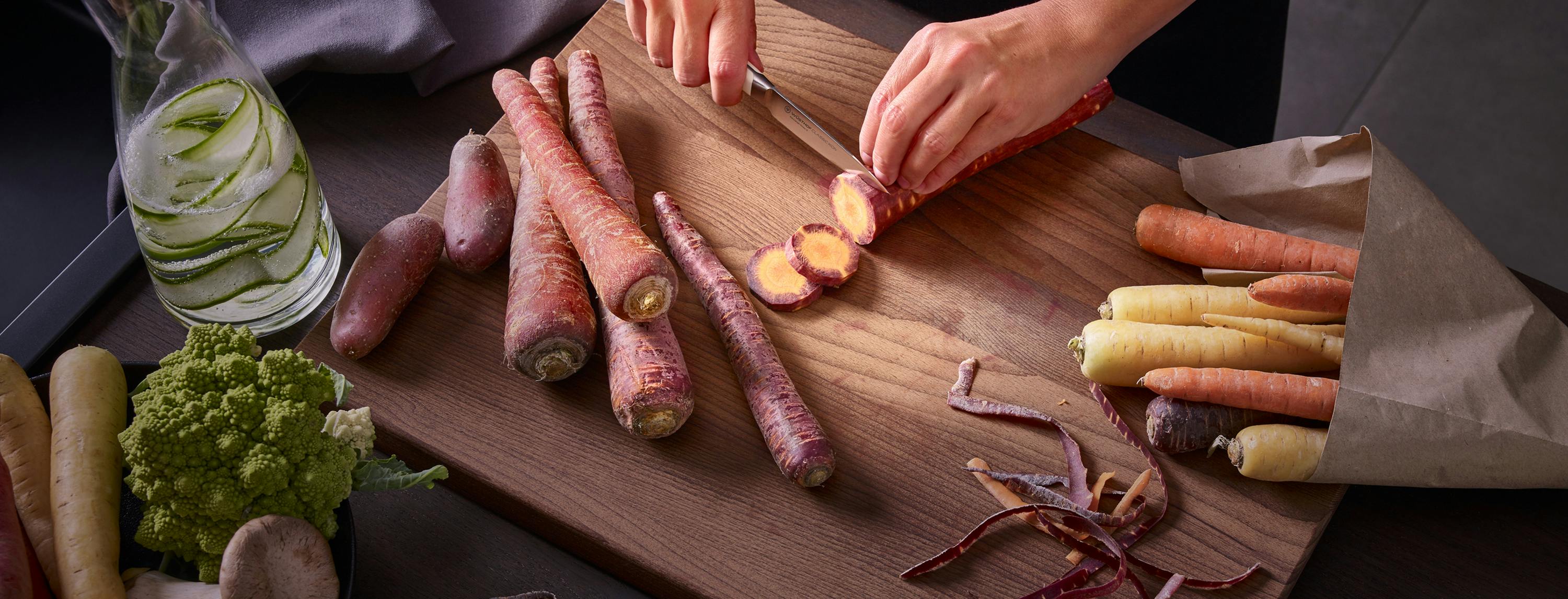The WÜSTHOF Carving Knife is designed to make slicing delicious roasts, thick-skinned fruits, or centerpiece vegetable dishes as clean, simple, and effortless as possible. Whether you’re carving the turkey at Thanksgiving, shaving ham into wafer-thin pieces, prepping cauliflower steaks, or slicing a cantaloupe into wedges, this long, graceful blade is always up to the task. The Straight Meat Fork, with its remarkably sharp, narrow prongs, is the carving knife’s number-one companion for portioning and plating when you’re ready to serve.
Carving Knife and Meat Fork
What makes the Carving Knife unique?
A good carving knife is crafted to maneuver around bones and help slice both raw and cooked roasts into even pieces. A great carving knife, however, builds on these essential characteristics to make carving a wide range of large, irregularly shaped, or tough-skinned ingredients a genuine pleasure. Perhaps the most innovative aspect of WÜSTHOF’s Hollow-Edge Carving Knife is the namesake hollow edges. These evenly spaced, vertical indentations along the blade create small air pockets that gently push ingredients off the knife to reducing sticking, friction, and drag. This feature means our carving knife is also excellent for prepping starchier ingredients (think: potatoes), not just meat alone. The long, narrow blade, which varies between eight and nine inches in length, is strong yet slightly flexible — this combination of power and pliability helps the blade guide the meat away from the bone, trim tough pieces of fat, and expertly break down larger or thicker fruits and vegetables. The pointed tip, meanwhile, acts as a built-in fillet knife, nimbly working around bones, tendons, ligaments, and fat caps.
When it comes to plating and serving, there is no better pair for the Hollow-Edge Carving Knife than the Straight Meat Fork. The two six-inch prongs are long, narrow, and very sharp, ensuring that nothing is torn or stressed as you carve your perfect ribeye or whole-roasted acorn squash. Like the carving knife, this meat fork features a triple-riveted handle to ensure long-lasting durability despite frequent use.
What is a carving knife used for?
Perhaps you’ve stared at a giant chuck roast and felt a little sweat around your forehead. How do you tackle such a large hunk of meat? Throw in bones, tendons, and hard bits of fat or cartilage…and it’s understandable that carving can be one of those tasks that some cooks find a bit intimidating. The antidote? Finding the perfect blade specifically designed to approach these foods with ease and efficiency.
The WÜSTHOF Hollow-Edge Carving Knife has earned its name as a champion for slicing grilled meats and large roasts of all kinds, but it’s also a great fit for starchy, sticky ingredients or tough-skinned fruits and vegetables. Use it for roasted turkey, holiday ham, and crispy-skinned chicken; bone-in pork chops or grilled pork tenderloin; big, celebratory briskets or any cut of steak; and even large, main-course vegetable dishes. The hollow edges mean it’s also perfect for sweet potatoes, celery root, squashes, and pumpkins, which slip right off the blade thanks to the small air pockets formed by the divots along the knife’s edge.
You might be wondering: Do you have to use a carving knife to, well, carve? Though you could get away with an all-purpose workhorse like a chef’s knife, you’ll notice the difference when you reach for a specialized blade. The precision, ease, and fluidity experienced with a traditional carving knife ensures that the hours you spent perfecting the textures and flavors of your delicious dishes remain intact. And most importantly, using the right knife for the task at hand maximizes kitchen safety, as these blades are designed for a distinct purpose.
How do you care for this knife?
Like all WÜSTHOF blades, this knife is crafted from premium materials and designed to last a lifetime with proper care. Both the Carving Knife and the Straight Meat Fork must be hand-washed with mild soap and water and immediately dried with a soft kitchen towel.
What’s a fun fact about this knife?
Carving knives have been used for thousands of years as professional trades like cooking and butchery evolved to require specialized tools for preparing meat. The longer, narrower blade, crafted with a touch of extra flexibility, is developed for exactly this purpose — you’ll see similar features in most fish and fillet knives, though the size and length of these blades will vary. In Germany, we even have a blade comparable to the carving knife called a schinkenmesser, or “ham knife.”






